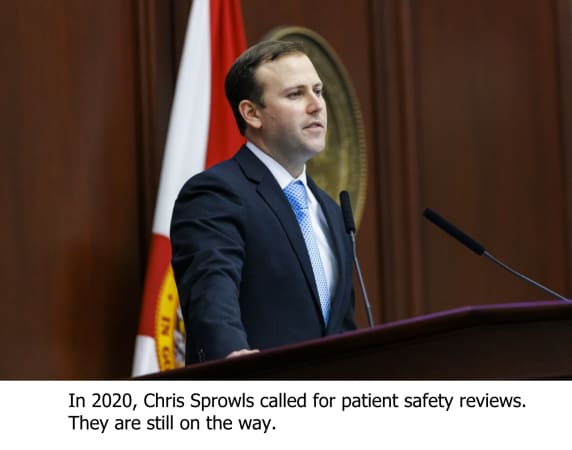
Welcome back to Diagnosis, a vertical that focuses on the crossroads of health care policy and politics.
— Medicaid expansion excluded from budget deal —
The surprising legislative budget deal that Senate Majority Leader Chuck Schumer and Sen. Joe Manchin announced last week in Washington D.C. has ramifications for Florida, including what’s not included in the proposed “Inflation Reduction Act.”
The measure deals with taxes and climate, but it also allows Medicare to negotiate on prescription drug prices, and it would continue Affordable Care Act subsidies through 2025.
But the proposal does not address Medicaid expansion which has been a major goal of Democrats from the 12 states that have not expanded Medicaid eligibility that was allowed under Obamacare.

House Democrats, including those from Florida, had been hopeful that a final budget reconciliation deal would create a workaround in non-expansion states. Florida’s Republican-controlled Legislature has rejected calls for expansion over the past 12 years.
Several members of Congress last Thursday wrote about their disappointment that the deal did not address Medicaid expansion and called on Schumer to add a provision to the legislation. The House passed a comprehensive bill that dealt with expansion last year.
“Millions of Americans have never received any benefit from the Affordable Care Act in states that failed to expand Medicaid due to sustained Republican opposition,” states the letter signed by 50 House members. “This has had devastating consequences for health equity, maternal mortality and substance use disorder, among many other public health crises.”
The letter adds “in your further work to move this legislation forward, it is essential that relief be provided for our most economically disadvantaged neighbors who have been stuck in the coverage gap for over a decade. We cannot afford to go home without something to help out those who have been left out and left behind for so long.”
Ten Florida Democrats, including Reps. Charlie Crist and Val Demings, both of whom are running for higher office, signed the letter. Crist, who is running for Governor, has made Medicaid expansion a part of his campaign platform and has vowed to veto any state budget that does not include expansion.
Medicaid expansion allowed states to expand coverage to uninsured childless adults with incomes up to 138% of the federal poverty level.
Florida Republicans, however, resisted calls for expansion, citing everything from fears of having the federal government reduce future payments to contending Medicaid is a broken program.
___
I welcome your feedback, questions, and, especially, your tips. You can contact me by emailing me at SextonHealthNewsletter@gmail.com or call me at 850-251-2317.
— Happy 57th birthday —
The health care programs that provide nearly 140 million Americans access to health care are 57 years old.
Department of Health and Human Services Secretary Xavier Becerra and Centers for Medicare and Medicaid Services (CMS) Administrator Chiquita Brooks-LaSure released the following statement: “On the 57th anniversary of Medicare and Medicaid, we celebrate the peace of mind that these critical programs are working to make it easier for people to navigate their health care options under each program.”
Among other things, the Biden administration has championed the extension of postpartum coverage to a full year after pregnancy for Medicaid parents and made care more accessible for the millions of seniors and people with disabilities by increasing funding for Medicaid home- and community-based services. Florida, unwilling to expand Medicaid under Obamacare, agreed to tap into the added postpartum benefits and $2.1 million in increased funds for home and community-based services.

Medicaid is the largest public health insurance program, covering more than 24% of the U.S. population. The latest state data show that more than 5.3 million Florida residents were enrolled in Medicaid as of June 30. Enrollment in the safety net program in Florida has never been higher and has been driven by the COVID-19 pandemic and the public health emergency issued following the spread of the virus in 2020. So long as the public health emergency stays in effect, Congress has agreed to increase the federal Medicaid payments by 6.2%. But the increased money means that the state cannot remove anyone from Medicaid, which the state and federal governments jointly administer.
Nationwide, Medicaid enrollment increased by 26.5% between February 2020 and before the COVID-19 pandemic to about 74 million people in March 2022. Medicaid supplies health care to the poor, elderly and disabled.
The program paid for 42.1% of all births in 2019.
There are another 64 million people enrolled in Medicare, which is administered solely by the federal government, and supplies health care coverage to people who are disabled or who are aged 65 and older regardless of income.
“Over the last 57 years, Medicare and Medicaid have connected people to lifesaving health coverage at critical moments in their lives,” Centers for Medicare and Medicaid Services Administrator Chiquita Brooks-LaSure said in a statement. “And while there is much to celebrate, we continue to be laser-focused on ensuring that the promise of these programs remains protected, more robust, and stronger than ever for generations to come. Happy 57th Birthday, Medicare, and Medicaid.”
— Changes for autism providers —
The Agency for Health Care Administration has changed how it pays for Medicaid applied behavior analysis services for children with autism.
AHCA says that the changes, part of an overhaul of how the state provides ABA services to children, are budget neutral but providers say otherwise.
The changes mean providers will use Current Procedural Terminology, or CPT, codes to bill their services, a move the Florida Association of Behavioral Analysis (FABA) providers support.
Developed by the American Medical Association, the standardized codes give health insurers, Medicare, Medicaid, and other payers the ability to track health care use, identify services for payment, and gather statistical health care information about populations.

But providers say that the CPT codes they are being told to use don’t perfectly align with the codes issued by the AMA. Specifically, the state won’t allow ABA providers to use “modifiers” for ongoing treatment services to differentiate who is working with the client.
Like other health care services, there is a team of providers working with the client, from a Board-Certified Behavior Analyst, which is a graduate-level certification in behavior analysis, to a registered behavior technician which is a paraprofessional certification in behavior analysis with 40 hours of training.
The higher the level of education and skill the higher the reimbursement.
By eliminating the modifier in the CPT code for the provision of ongoing treatment services the state is reimbursing providers at the RBT rate which is 36% less than the BCBA rate.
“The lack of a … modifier conflicts with recommendations from the AMA that state services provided by a professional behavior analyst rather than an RBT should be reported with an appropriate modifier and reimbursed at a rate that is appropriate for the professional-level provider,” the FABA wrote in a letter to AHCA.
It’s not the only concern FABA raises in its letter to the state.
AHCA, which administers the Medicaid program, adopted the CPTs for ABA services supplied outside of the Medicaid managed care setting, as part of the state’s efforts to ferret fraud and abuse out of the system.
AHCA announced in 2018 that the costs of applied behavior analysis therapy to the state more than doubled from 2016 to 2018. The agency put the blame on unqualified providers rendering unnecessary services. The actual amount of fraud was never released by the state, however.
“FABA is very concerned that the fee schedule is not “budget neutral,’ “the letter states.
AHCA has said in public meetings the modifier was dropped because the state doesn’t want to reimburse ABA services provided and not the qualifications of the provider. But in its letter, the association notes that there are modifiers for other ABA CPT service categories.
“Our providers have informed us if modifiers are not added … many children with serious challenging behavior will lose services from their current providers,” the letter notes.
The post Diagnosis for 8.1.22: Checking the pulse of Florida health care news and policy appeared first on Florida Politics – Campaigns & Elections. Lobbying & Government..
Republished with permission [/vc_message]
Disclaimer
The information contained in South Florida Reporter is for general information purposes only.
The South Florida Reporter assumes no responsibility for errors or omissions in the contents of the Service.
In no event shall the South Florida Reporter be liable for any special, direct, indirect, consequential, or incidental damages or any damages whatsoever, whether in an action of contract, negligence or other tort, arising out of or in connection with the use of the Service or the contents of the Service.
The Company reserves the right to make additions, deletions, or modifications to the contents of the Service at any time without prior notice.
The Company does not warrant that the Service is free of viruses or other harmful components












